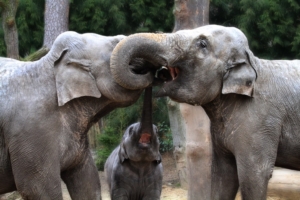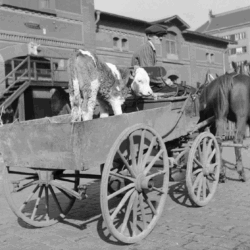| Source (Yiddish) | Transliteration (Romanized Yiddish) | Translation (English) |
|---|---|---|
צַעַר בַּעֲלֵי־חַיִּים, צַעַר בַּעֲלֵי־חַיִּים, מע טאָר נישט מאַכן אַ „בּוּבּוּ‟ פֿאַר אַ חַיָּה. (וײַל) אויבּ מע מאַכט אַ „בּוּבּוּ‟ פֿאַר אַ חַיָּה , פֿאַנגט עס (הײבט זי) אָן צו װײַנען: „אױ װײַ, סע טוט מיר װײַ, אױ װײַ, סע טוט מיר װײַ. אױ װײַ, סע טוט מיר װײַ.‟ סע שטײט אין דער הײליקער תּוֹרָה, מע טאָר נישט מאַכן אַ „בּוּבּוּ‟ פֿאַר אַ חַיָּה. |
Tsaar balei ḥayyim, tsaar balei ḥayyim, me tor nisht makhn a booboo far a ḥaye, (Vayl) oyb me makht a booboo far a ḥaye, Fangt es (Haybt zi) on tsu vaynen Oy Vay, Se tit mir vay Oy Vay, Se tit mir vay Oy Vay, Se tit mir vay Se shtayt in der hayliker Torah Me tor nisht makhn a booboo far a ḥaye |
Tsaar baalei ḥayyim, tsaar baalei ḥayyim, One may not make a booboo for an animal (Because) if one makes a booboo for an animal, She begins to cry “Woe, woe, it hurts me” “Woe, woe, it hurts me” “Woe, woe, it hurts me” It is in the Holy Torah One may not make a booboo for an animal. |
“Tsaar Balei Ḥayyim” ([It is forbidden to cause] suffering to a living creature), source unknown. Many thanks to Tiferet Zimmern-Kahan for recording the niggun for the song and to Naftali Ejdelman (Yiddish Farm School) and The Jewish Daily Forward for providing the lyrics.
Among other verses, the mitsvah of tsaar baalei ḥayyim is derived from Genesis 9:4, as interpreted in the Talmud (Sanhedrin 59a). Compassion for animals is declared to have been the merit of Moshe which made him the shepherd of his people (Exodus Rabbah 2), while Yehudah ha-Nasi saw in his own ailment the punishment for having once failed to show compassion for a frightened calf (Bava Metzia 85a). The aggadic (mythic) tradition concerned with the origin of predatory nature in Olam Hazeh (this world) can be found in the Jewish deutero-canonical works of Sefer Ḥanokh (1 Enoch) and Sefer haYovelim (Jubilees) as well as in Midrash Abkir and the collection of rabbinic midrash and midrash aggadah, Yalkut Shimoni.
In Sefer haYovelim (a/k/a Jubilees, circa 3rd century BCE), the need for circumscribing the predatory nature of humankind after the Dor Hamabul (depraved generation of the Flood) is given as the raison d’etre for the giving of the Torah. As required by the covenant of the Rainbow made to Noaḥ and his descendants after the flood, a representative people was needed who might abide by the general commandment of ever min haḥai (forbidding eating living creatures). In this tradition, Avraham was the first to prove worthy since his actions epitomized ḥesed, lovingkindness (an innovation in Judaism’s mytho-historic chronicle of humanity in Genesis). As noted in Rav Shlomo Kluger’s HaElef L’cha Shlomo in Yoreh Deah 322, dairy foods, the product of living creatures, were prohibited after the Flood, but this prohibition was relaxed upon the giving of the Torah at Sinai just as the prohibition against eating flesh was relaxed after the covenant at Ararat. For this reason, dairy is a symbolic food eaten on the festival of Shavuot (Pentecost) and remains a symbolic food representing the subversion of predatory nature as reflected in Megilat Yehudith and the dairy food traditions of the festival of Ḥanukkah. (More here.)
Recordings

“צער בעלי־חיים | Tsaar Baalei Ḥayyim [It is forbidden to cause] suffering to a living creature, a song in Yiddish” is shared through the Open Siddur Project with a Creative Commons Attribution-ShareAlike 4.0 International copyleft license.










For a rockin’ rendition of this song, listen to Aba Winkler in this video. (Moishe Glick on the keyboard):
H/T Sam Zerin.